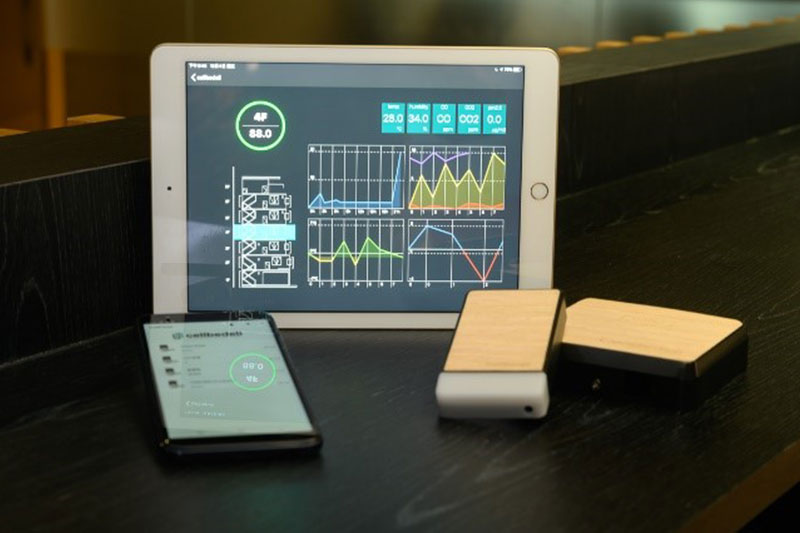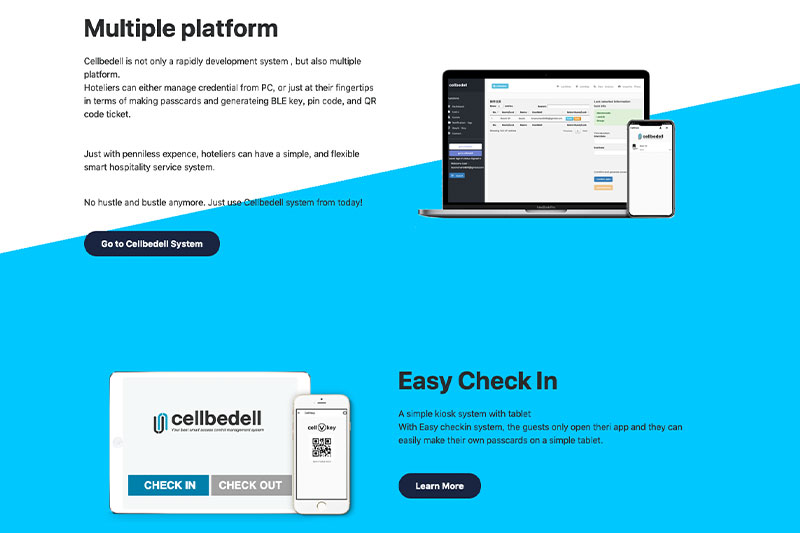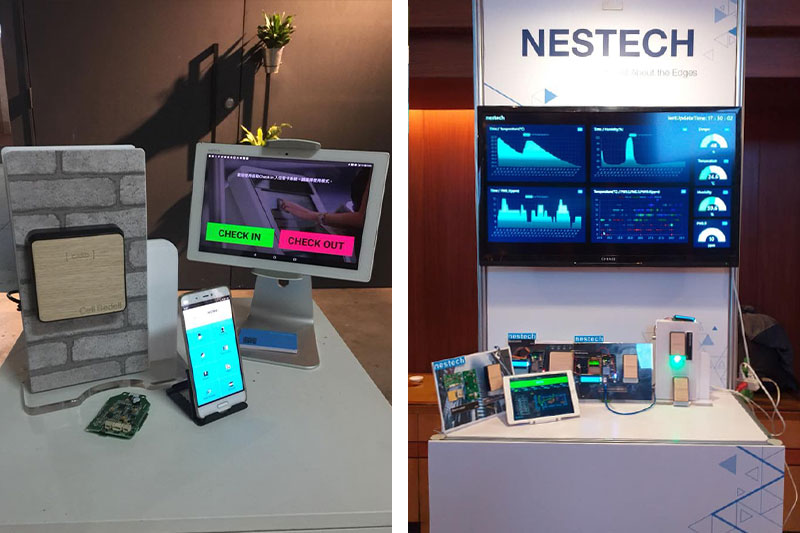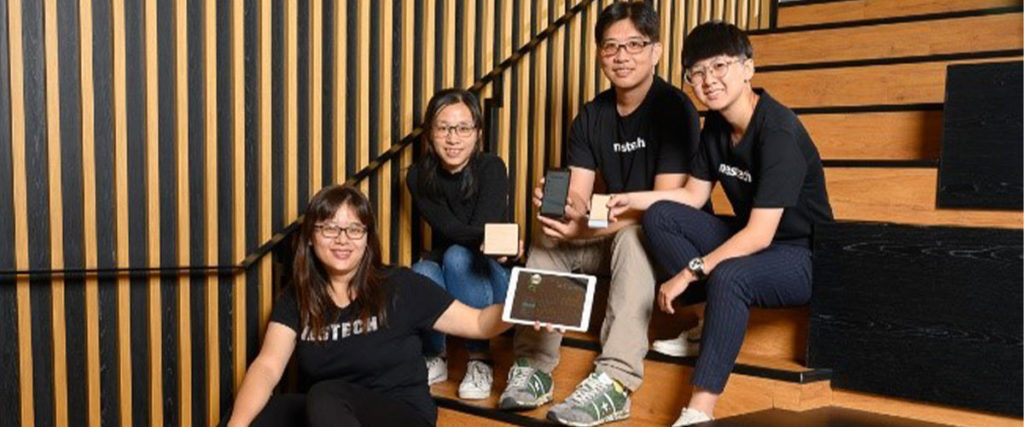Kristy Yeh, the co-founder behind Taiwan’s award-winning smart building tech startup Nestech, is saving lives – and opening doors to a smarter city with IoT, 5G and edge computing.
Having just recently won the ‘Smart City’ category at the 2020 CES Innovation Awards, it’s clear that Nestech, an ICT integration company specialising in access control solutions, has ambitious plans for Taiwan’s skyscrapers in the future. Of the hotel automation and smart tech group’s four founders, three are engineers, and the fourth is Kristy Yeh, who oversees marketing and partnerships with investors and clients. “Our group originally came from Taiwan where it was very good to specialise in technology and development and learn startup-related or entrepreneurial skills,” says Kristy. Since then, they’ve launched a business specialising in making buildings safer, increasing security through AI and edge computing technologies. Joining the latest in an industry of automated, energy-efficient tech, Nestech has branched out to innovate programs like CellBedell, a physical access control system for hotels and offices, and FIND, the now award-winning intelligent early-fire-detection system due to be released in the final quarter of 2020.

“This surprised us very, very much,” says Kristy of their win at the 2020 CES Innovation Awards, an annual competition honouring outstanding design and engineering in consumer technology products from around the world. Nestech’s latest prototype, FIND, an intelligent fire network system, is a modern-day replacement for earlier, less sensitive generations of fire warning systems. FIND is designed to speed up responses to danger by delivering early warnings to administrators in the building, and saving time in situations where time is of the necessity. It comes with 5 colour-coded indicators that relay information about smoke and carbon monoxide levels, temperature, and humidity detected by sensors placed outside an exit or inside a room. Using edge and cloud computing, NBIoT (Narrowband IoT) and 5G technologies, Nestech claims the system increases survival rates by up to 70%, just by early detection. “If you use our solution, all you have to do is look at the colour indicator to see if you should push that door,” Kristy explains.
You might also like Smart Bins: The Key to Cleaner Cities?

The launch of FIND follows Nestech’s smart control system CellBedell, which was released in 2017. The smart control system is a security feature that controls access to properties, whether that be hotels, offices, and schools. Each CellBedell system is equipped with 60 door locks and five tablets that effectively automate all front desk duties, and can also incorporate the FIND system in its infrastructure. Replacing traditional access systems, which tend to have “a very big kiosk, which is very burdensome and slow and very traditional,” CellBedell frees up time for hosts to focus on improving other aspects of their business by removing check-in times, combination code resets, and key handovers. It can be used offline, does not require any cabling, allows remote check-ins, and ensures direct payments to their merchants. The administrator only has to download Nestech’s app, Cellbeans, on a device to send a PIN (either a numeric code or a QR code) to the customer and set it to expire on the day of checkout. But it is their competitive price and easy usability that allows Nestech to gain an edge over their competitors. “So far in 2020, high-tech only exists in five-star hotels like Sheraton, Hilton, or the Marriott,” Kristy explains. For family-run businesses, BnBs, and smaller hotels, obtaining performance-enhancing smart control systems is otherwise near impossible. “Even if they want to get a very good guest experience, most are limited by their budgets because this technology is very expensive for them.” Giants like Samsung and Siemens are just some of the big names involved in the smart access control industry, but Nestech’s integrated hospitality solution is a rogue turn in this relatively new industry. “What we’re doing now is providing a more cost-effective, more portable and flexible solution when compared to these big companies – and because we‘re a startup, we can provide them very quickly,” Kristy says.

CellBedell has already been very well received across Central America and Southeast Asia’s biggest markets, including in Singapore, Thailand, and Chile. For a relatively new entry still adjusting to the market, they already have a projected USD 6 million in market share and a revenue of about USD 1 million. Following the launch of their FIND system, the team had expected to reach USD 6 million in revenue – no one could have predicted the economic standstill the coronavirus, 2020’s black swan, has caused, although Kristy remains optimistic. CellBedell is currently available at a fraction of the price of other smart building solutions in the market. At just 25% of the market price, small hospitality vendors gain a cost-effective solution. Compared to the market average of paying NTD 5-6 million (approx USD 150,000 – 200,000) for the entire access control system, the purchase of both the software (CellBedell) and the hardware (door locks) costs a sixth of the price – NTD 100,000 (approx USD 3000).
As the smart tech ecosystem continues to gain traction globally, Taiwan’s tech landscape has been fairly slow to adapt. Having worked in the startup haven that is Silicon Valley, Kristy says that loose regulations and financial support there play a significant role in helping startups get through the tough hardships of keeping on top of taxes, wages, and growth, but admits that Taiwan doesn’t offer that same environment. Though slow to catch on, this is something that is gradually changing – in 2018, the Taiwanese government helped subsidise the tech and entrepreneurial hub Taiwan Tech Arena (TTA) to offer startups a platform to gain footing on, utilising TTA’s partnerships with international accelerators, corporate partners, and capital market access. As smart technology evolves, it’s clear that Taiwan will join the rest of Southeast Asia in establishing themselves as key players on the scene.
In anticipation of the commercial launch of FIND with CellBedell, Kristy tells us what’s next for Nestech. “Our biggest challenge right now is raising money – we need money to optimise our fire detection system and to launch the new product. This all needs resources,” Kristy pauses before she swiftly adds, “So, we very much welcome investors to get in touch with us,” flashing a wide grin.
Related Articles
Could Coliving be the Answer for Asia’s Expensive Cities? This Startup Thinks So.
ORII: The Smart Ring that Promises a Future of Screenless Connectivity
AI-Driven Architecture Could Be the Future. Meet the Professor Making It Happen.





